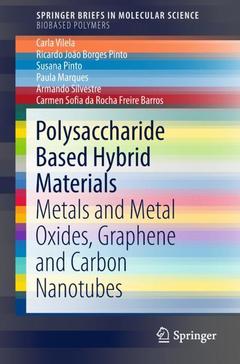Description
Polysaccharide Based Hybrid Materials, 1st ed. 2018
Metals and Metal Oxides, Graphene and Carbon Nanotubes
Biobased Polymers Series
Authors: Vilela Carla, Pinto Ricardo João Borges, Pinto Susana, Marques Paula, Silvestre Armando, da Rocha Freire Barros Carmen Sofia
Language: English
Subject for Polysaccharide Based Hybrid Materials:
52.74 €
In Print (Delivery period: 15 days).
Add to cartSupport: Print on demand
Description
/li>Contents
/li>Biography
/li>Comment
/li>
Carla Vilela (PhD), postdoctoral researcher at CICECO – Aveiro Institute of Materials, University of Aveiro.
Her research interests are dedicated to the sustainable use of biopolymers (bacterial cellulose, chitosan, alginate, pullulan, proteins, etc.) to design and engineer functional nanostructured materials for both biomedical (e.g. drug delivery and wound healing) and technological (e.g. active packaging and fuel cells) applications.
ORCID: https://orcid.org/0000-0002-9212-2704 .
Ricardo Pinto (PhD),Post-Doc Researcher at CICECO-Aveiro Institute of Materials and TEMA (Centre of Mechanical Technology and Automation of Aveiro), University of Aveiro
Research interests: metallic nanoparticles biosynthesis using plant extracts and preparation and characterization of biobased nanocomposites materials for antimicrobial, catalytic, and conductive applications.
ORCID: https://orcid.org/0000-0001-5600-2396).
Susana Pinto is a PhD student at the Centre of Mechanical Technology and Automation of Aveiro (TEMA-NRG), Department of Mechanical Engineering - University of Aveiro, holding a doctoral grant from the Portuguese Foundation from Science and Technology (SFRH/BD/111515/2015).
Her current interests include the preparation and characterization of multifunctional nanocomposite materials based on cellulose/graphene cellular materials.
ORCID: https://orcid.org/0000-0003-2658-1045
Paula Marques (PhD), Principal Researcher at TEMA (Centre of Mechanical Technology and Automation of Aveiro) from the Department of Mechanical Engineering, University of Aveiro.
Research interests: engineering and development of mechanical and electrical stimulus responsive 3D graphene/polymer fibrous scaffolds for tissue engineering; production and application of functionalized graphene-based foams for water remediation



